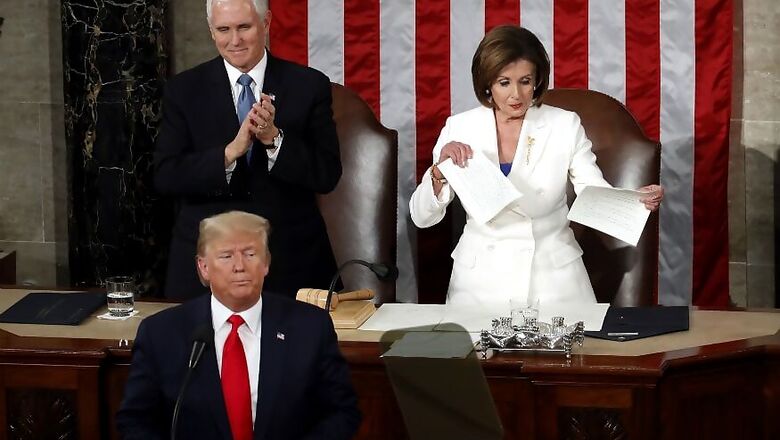
views
Washington: In Hollywood, it is called a false ending – where the story appears to be heading to a close but is not yet over.
President Donald Trump’s impeachment trial ended on Wednesday with a conclusion that was unsurprising – his acquittal. But in reality the end of the story will play out in November, when American voters go to the polls.
That is when Democrats will finally learn whether their gamble to impeach a president for the third time in US history paid any electoral dividends in winning over undecided voters. Opinion polls during the impeachment proceedings suggested little political harm to Trump as opinions among Republicans and Democrats were largely entrenched from the outset.
November is also when Republican Party lawmakers in the US Congress, especially those in districts and states that are a toss-up, may learn the political costs of erecting a human wall to block efforts to remove Trump from the Oval Office.
Trump's lawyers argued that with elections nine months away it should be left to the voters to render the final verdict on whether Trump abused his office by pressuring Ukraine to investigate a Democratic political rival, Joe Biden.
The impact of the trial on the election is far from clear. By the time Election Day arrives, Trump's impeachment, and the partisan battle around it, may be a distant memory for many voters more focused on bread-and-butter issues.
Still, the impeachment of one of the most polarizing presidents in modern US history has shaken up the election race by energizing both parties' bases. "I think it's done one good thing for Democrats. It has awakened some of the activists to the very real possibility that Trump will win a second term," said Larry Sabato, director of the University of Virginia’s Center for Politics.
Trump has raised millions of dollars for his re-election campaign off the impeachment trial, netting $46 million in the fourth quarter of 2019 in the most lucrative haul of his re-election campaign. The money, raised during the impeachment inquiry, was mostly from supporters angry at Democratic efforts to oust him from office, Republican officials said.
Democrats, who have to worry about their fragile controlling majority in the House, saw massive fundraising spikes too on both Democratic presidential candidates and in congressional races. Republicans and Democrats are likely to attack their opponents' impeachment votes in the Senate and the House of Representatives in media ads during the election campaign, some political analysts said. In some places that has already begun.
Representative Joe Cunningham, a Democrat who flipped a South Carolina district in 2018 that had been Republican for decades, launched advertisements in his district this month to emphasise his legislative achievements to counter a wave of anti-impeachment attack ads by Republicans.
Cunningham's approach echoes that of many Democrats, especially in vulnerable districts: Say little about impeachment and focus on accomplishments. "I just want to make sure the record is clear on exactly what we are doing, and where our focus is," the congressman said.




















Comments
0 comment